How to Rank #1 on Google: Top Local SEO Strategies for Real Estate Businesses
Introduction: Why Local SEO is Crucial for Real Estate Agents
Just having a website is not enough in today’s hyper-competitive real estate SEO market. To improve Google ranking factors for local SEO and attract quality leads, you need to ensure your real estate business is showing up in local search results through SEO for real estate agents. Given that over 90% of homebuyers begin their search online, local SEO isn’t a marketing tactic, it’s a necessity.
Real estate is a local business par excellence. Most buyers and sellers typically search agents, listings, and services within specific cities or even by neighbourhood or zip codes. The best way to bring local buyers and sellers is to rank #1 on Google’s local search results.
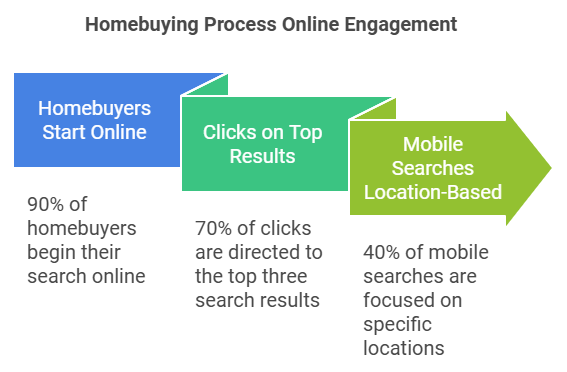
Picture this: In the case that a potential homebuyer has her/his eyes on “best real estate agents near me” or “homes for sale in [city].” Missing out on leads is a significant conquest if your realty business isn’t ranking on the first page (or, ideally, the No.1 spot).
If you’re a real estate agent, broker, property manager, or agency that wants to get better at local SEO, attract more clients, and rank higher in local Google, this post is for you. This guide will show you step by step how to dominate your local market, rank number one, and be the go-to real estate expert in your area if you want to do that.
You’ll learn top local SEO strategies tailored to the real estate industry that will boost your online presence, increase lead generation, and, ultimately, help you rank #1 on Google for relevant local searches.
Understand Local SEO and Its Impact on Your Real Estate Business
What is Local SEO?
Local SEO for real estate is optimizing your presence on the Internet to help your website rank higher in location-specific search results for relevant real estate searches, particularly when aiming to rank number one in local search results and attract targeted leads.
Your business can not happen when people search for real estate services in your city or one other neighborhood, your business must show up notably within the results.
Example: What if a homebuyer wanted to search “homes for sale in Boston”? In ideal situations, they should see listings, reviews, and real estate agent information for Boston at the top of the search results. In a sentence, that’s what local SEO is all about.
What’s the difference between Local SEO for real estate and regular SEO strategies for real estate business?
Regular SEO: This is focused on broader keywords with aspirations of a national or even global reach. However, Local SEO for real estate agents focuses on location-specific keywords that target local homebuyers and sellers.
Example: Ranking for ‘real estate marketing tips.’
Local SEO: Runs location-specific keywords that help your business to appear in local search results and Google Maps.
Example: For ‘real estate agents in [City Name],’ incorporating best SEO strategies for real estate websites to rank in local search results will ensure that your business rises above the competition in local search.
| Aspect | Regular SEO | Local SEO |
| Keywords | General and broad | Location-specific |
| Target Audience | Nationwide or global | Local customers |
| Primary Goal | Drive traffic | Get high-intent leads in your region. |
How can local SEO help me attract more homebuyers to my city?
By optimising your website and online profiles for location-specific keywords, you can:
Rank Higher: When potential buyers search for homes in your city, they’ll appear at the top.
Reach Qualified Leads: You will be able to communicate directly with people actively searching for residences in your area.
Why Local SEO is Crucial for Real Estate Businesses
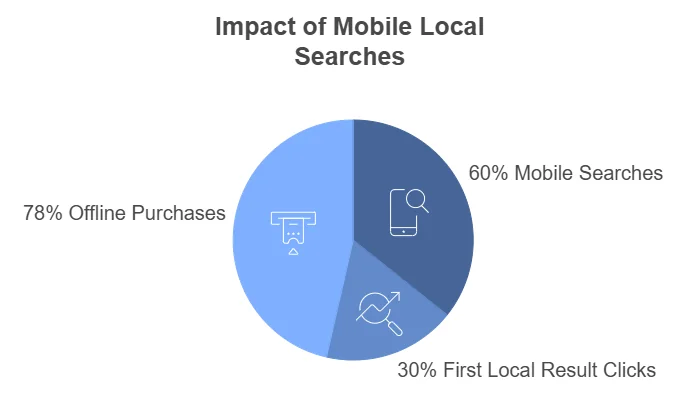
Increased Visibility: Local search results have the power to create more visibility for your real estate services in front of active searchers in your area.
Higher Conversion Rates: Local search traffic is very qualified. Real searchers are ready to engage, increasing your conversion potential vastly over the typical non-local search.
Mobile-First: With 60% of Google searches happening on mobile devices, it’s more important than ever to optimise yourself both for mobile and for local searches that help you connect with buyers and sellers on the move.
How long does it take to see results from Local SEO efforts?
Local SEO is a long-term strategy, and results can take anywhere from 3 to 6 months depending on:
The competition in your area.
The quality of your content.
Optimisation efforts that are consistent.
Is it possible for me to optimise my own real estate business SEO, or should I get an expert to do it?
DIY Local SEO: You can do the basics like setting up your Google My Business, optimizing your website, or even begin the process of simply getting reviews.
Hire an Expert: Being an ongoing process that always needs to stay updated on trends and algorithm changes, SEO is quite tough work. Hiring an expert comes with faster rankings and optimised strategies according to your market.
Pro Tip: If you’re looking to boost your visibility and improve Google rankings for real estate, consider hiring a digital marketing services for real estate websites company that specializes in local SEO.
They can guide you through the latest techniques to get your business ranking higher in Google’s local search results
Optimize Your Google My Business (GMB) Profile for Local Visibility
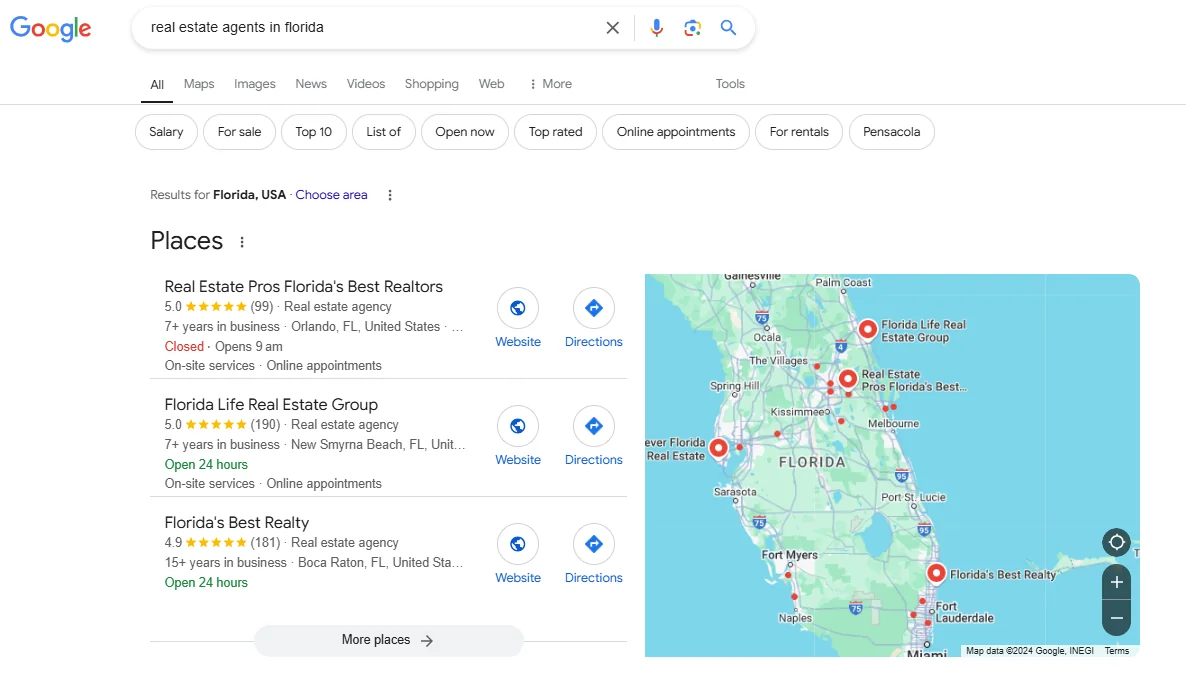
Claim and Complete Your Google My Business for Real Estate Listing
One of the most effective SEO strategies for real estate websites is optimizing your Google My Business for real estate profile. This is a crucial aspect of local SEO strategies for real estate businesses, as it helps your business rank prominently in local search results and appear on Google Maps.
Steps to Get Started:
Claim Your Listing: Claiming your GMB listing enables you to manage your business information.
NAP Consistency: Make sure your Name, Address, and Phone Number (NAP) are the same on all directories, social media, and your website. The details should be consistent to prevent confusion among customers and tarnishing the credibility of your business.
Complete All Fields:
Business Hours: You add the hours you’re available, including holidays.
Office Address and Phone Number: For local customers, keep these accurate.
Business Description: Make your real estate services stand out more with location specific keywords like “homes for sale in [City]”.
Website URL: Point to a section of your homepage or a page dedicated to website development for real estate, highlighting the services you offer and how they can help improve your business’s online presence.
Tip: Increasing your chances of ranking in the Google Local Pack (Top 3 local results) with SEO services for US real estate agents comes with a fully completed GMB profile.
Add High-Quality Photos and Videos

(Image courtesy: Google)
Engagement and building of trust with potential clients can’t happen without visual content.
Photos to Include:
Exterior and interior of your office.
Ideally, your team is actually in action (open house, for example).
These feature attractive visuals of the listings.
Virtual Tours: Provide 360-degree virtual tours or walkthroughs of the featured properties to stand out.
Why Videos Matter:
Profiles with dynamic content hold a higher priority for Google. Display property walkthrough videos, neighborhood guides, or a short introduction about you, introducing you as a local USPM (how I always refer to myself).
Solicit and Respond to Reviews
Local clients’ reviews do much more than improve your local SEO performance and paint a better picture of your reputation.
Why Reviews Matter: High volume of positive reviews (positive reviews to negative ratios as high as 10:1) indicate trust and credibility to Google, and to potential clients. Local search rankings depend on reviews.
How to Get More Reviews:
After a sale or showing, they can send up feedback from contented clients.
Personalised follow-ups via Gmb’s email and text with a link to the profile.
Engage with Reviews:
Positive Reviews: Thank reviewers. Example: I thank you so much for the kind words you sent me. It’s lovely hearing we’ve been able to help you find your dream home.”
Negative Reviews: Respond with a professional address to deal with the issue. Example: “We know how you’ve felt.” To resolve this, please reach out to us.”
Pro Tip: Review engagement means an activity that Google will notice, boosting your ranking.
Optimize Your Website for Local SEO
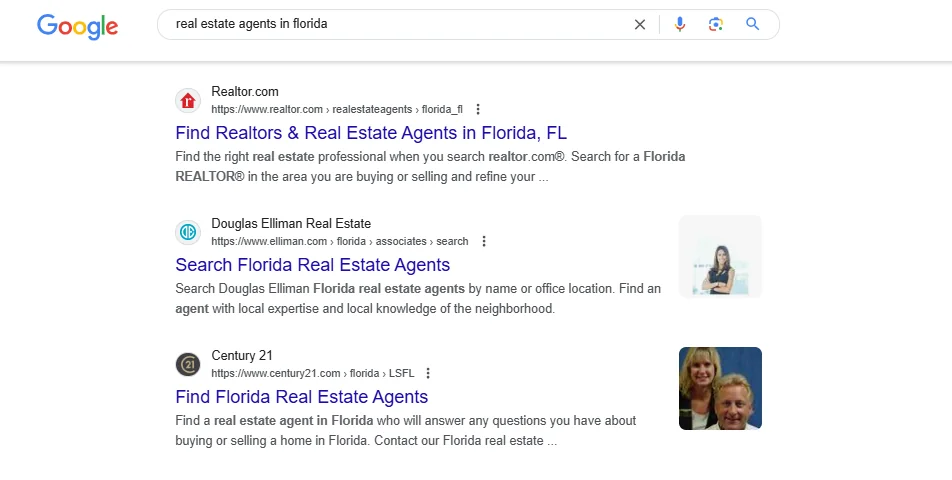
SEO strategies for real estate business: Keyword Research for Location-Specific Terms
Finding the right location-specific keywords is a vital part of local SEO success. Consider the phrases that potential homebuyers or sellers in your area might use, like ‘best real estate agents in [city].
How to Find Location-Specific SEO Keywords for Real Estate:
Identifying location-based keywords for real estate use tools like Google Keyword Planner, Ahrefs or Moz.
In analyzing the keywords competitors rank for on their sites, you’ll be able to determine which location based keywords they are truly ranking for.
Example Location-Specific Keywords for Real Estate in Miami:
“Homes for sale in Miami”
“Miami’s best real estate agent”
“Trends in Miami real estate market”
Integrating Keywords Effectively:

(Image courtesy: Google)
Place keywords in strategic on-page locations to maximise visibility and ranking potential:
Page Titles: Include location + services. Example: [miami Agency Name Luxury Home — Your Agency Name]
Meta Descriptions: Write a succinct and exciting summary. Example: “How To [Do It] with [Your Name] in the top Real Estate Opportunities in Miami.” … find homes, condos, and more!
Headings (H1, H2): Your headings should be descriptive and include keyword-optimized terms. Example: “So why Miami is the Best Place to Buy Your Next Home.”
Alt Text for Images: Keyword your visuals. Example: “Find Luxury condos for sale in Downtown Miami.”
Create location-specific landing pages for more targeted real estate leads
If you serve multiple areas, creating custom pages for each location can do wonders for your local rankings.
What to Include on Location Pages:
Local Market Insights:
Write about property prices, details on neighbourhood trends, and buying and selling tips for the area.
- Example: On popular neighbourhoods such as Beverly Hills or Santa Monica for Los Angeles.
Local Listings:
Show real-time property listings in an area with IDX feeds.
Or, create a featured homes or properties list you curated for that neighbourhood.
Neighbourhood Guides:
It can offer comprehensive details about local schools, parks, restaurants and public services as a value to visitors.
Pro Tip: Make each page unique to avoid duplication penalties. Focus on hyper-localized content to target specific buyers and sellers.
Here’s a Quick Comparison of neighbourhood features
| Neighbourhood | Avg. Home Price | School Rating | Amenities |
| Brickell, Miami | $800,000 | A | Parks, restaurants, shops |
| Coral Gables, Miami | $1,200,000 | A+ | Historic homes, museums |
Ensure Mobile Optimization
Considering that over 60% of real estate searches are carried out on mobile devices, a mobile friendly site simply isn’t an option.
Steps for Mobile Optimization:
Responsive Design: Be sure to adapt your site to accommodate every possible screen size.
Page Speed:
One method of analysing and improving the speed of your site is by using Google PageSpeed Insights.
Minimise codes, enable browser caching and compress images to reduce the load time.
Simplified Navigation: Provide easy access to search property listings, making contact forms, and service pages via mobile users.
Clickable CTAs: Actions like “Contact Us” or “View Listings” should use easy to tap buttons.
Local Content Marketing: Position Yourself as the Go-To Local Expert
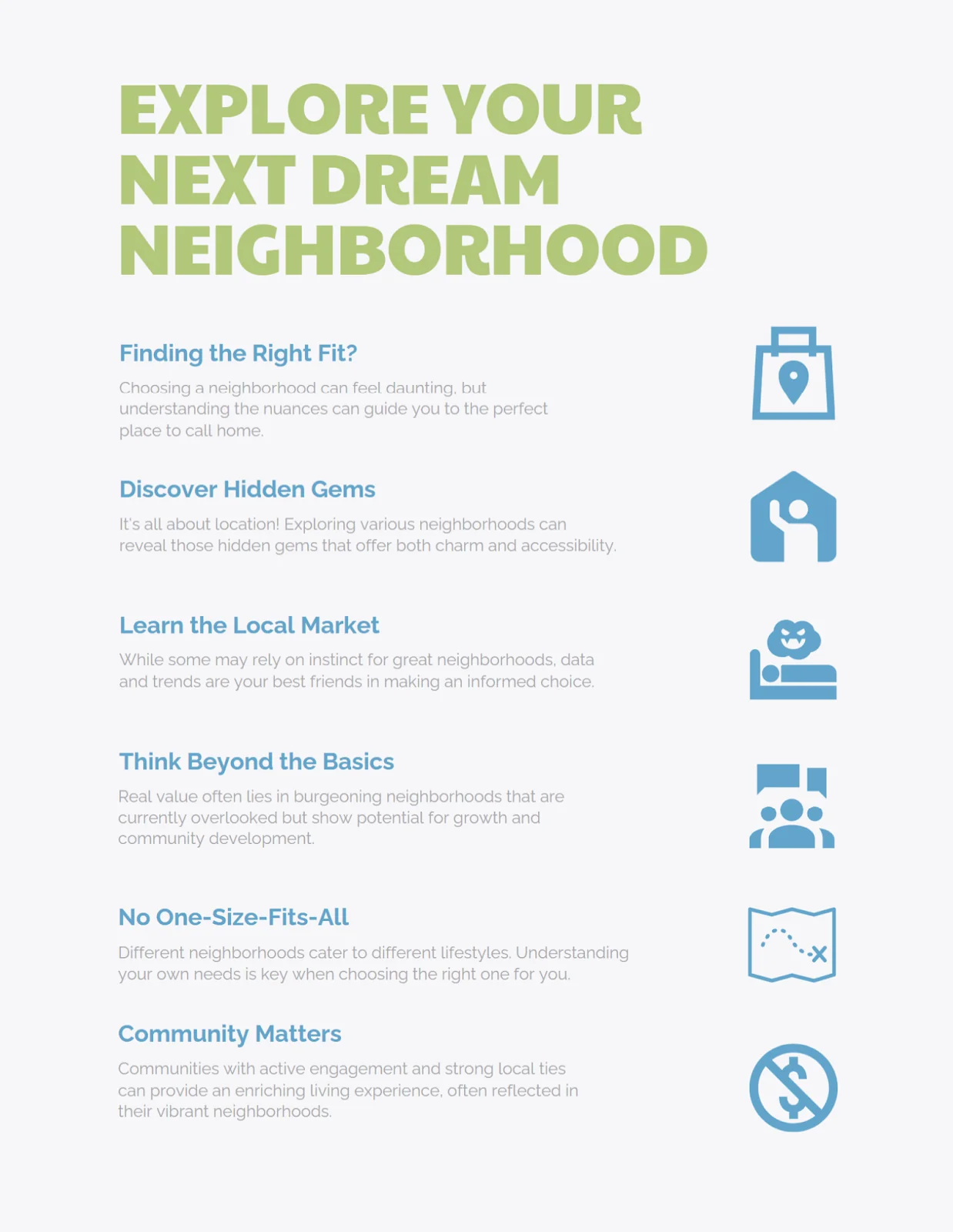
Write Local SEO Blog Content for Real Estate Businesses to Attract More Targeted Leads
A simple way to promote your real estate website is to publish blog posts which are mainly focused on particular interests that your local audience has as this will increase the visibility and credibility of your website.
Digital marketing for real estate businesses can significantly benefit from creating hyper-local blog content that resonates with the community. By producing blog posts that feature local events, home buying tips, or market trends, you increase your visibility for local searches. This strategy not only improves local SEO rankings but also positions your business as the trusted expert in your area.
Why Local Blog Content Matters:
Localised content attracts readers who are actively searching for your area.
It uses local keywords naturally, so it helps increase your search rankings.
Ideas for High-Impact Local SEO Blog Posts for Real Estate:
“The Best Neighborhoods in [City] for Young Families”: Call attention to neighborhoods with parks, schools, and neighborhood friendly amenities.
“How to Buy a Home in [Neighborhood]: “complete guide” to first-time buyers and new area investors, etc.
“5 Reasons Why [City] Is a Great Place to Invest in Real Estate in 2024”: Add in some economic factors, some growth trends, and testimonials from local investors.
Best Practices:
Put high-quality visuals such as neighbourhood maps, property pictures, and local attractions in posts to engage people, helping your real estate business rank higher on Google.
Every blog should end with a call to action, clicking on related property listings or your contact form.
Use Local News and Trends in Your Content Strategy
If you want to become an authority in real estate in your market, you need to maintain it and step up your game to keep up with what is happening in your local real estate market.
How to Leverage Local Trends:
Monitor news sources for updates on zoning laws, infrastructure projects, or real estate market trends.
Translate these updates into blog posts, video content, or social media updates.
Example Content Ideas:
“How the New [City] Zoning Laws Will Impact Real Estate Buyers”: Explain changes and offer actionable advice for buyers and sellers.
“The Impact of New Public Transportation in [City] on Property Values”: Analyze how upcoming transit projects could increase property demand.
Pro Tip: Use Google Alerts for terms like “[City] real estate news” to stay informed.
Engage with Local Influencers and Communities
Collaborating with local influencers, businesses, organizations creates you as a trusted local figure with the ability to expand your reach.
Why Engage Locally?
Builds credibility through association with well-known local figures.
It creates opportunities for backlink generation and improves your site’s domain authority.
Strategies for Community Engagement:
Partner with Local Influencers:
Work with popular social media influencers in your area who cover lifestyle, home décor, and local events.
Example: Invite an influencer to a tour of your property and share the experience with your followers.
Guest Posting and Features:
Write guest blogs for local community websites or neighbourhood associations.
Example: “Top Home Buying Tips from [Your Name], a Local Real Estate Expert” for a neighbourhood blog.
Community Events:
- Host or sponsor events like open houses, local meetups, or charity drives. Share event photos and insights in your blog or social media.
Source: https://www.sigmasolve.com/blog/seo-for-real-estate/
